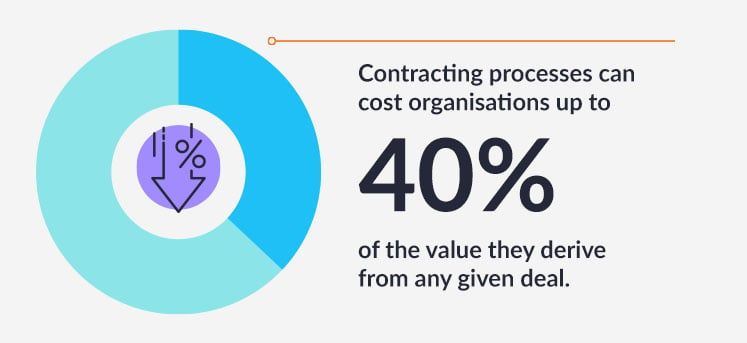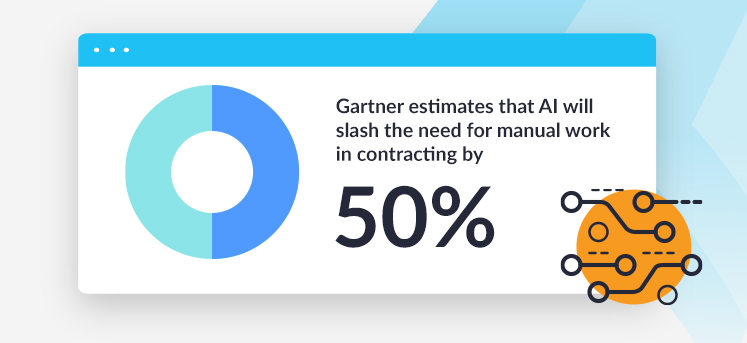For too long, inside counsel has been plagued by inefficient, overly time-consuming contracting processes. Legal operations can offer a better approach—contract acceleration.
Legal operations departments are well placed to assist inside counsel, helping them be more productive, accurate, and valuable to the organisation at large. There is one major area that requires this kind of optimisation: contracting.
As important as it may be, the current contracting process is overly manual, with a tangible lack of technology to assist the lawyer. This means that inside counsel spend too much time poring over the minutiae. Endless revisions are required just to make sure that nothing is missed, with this perennial back-and-forth eating into organisations’ margins and even threatening to kill deals.
Consider the fact that ineffective contracting processes can cost organisations up to 40% of the value they derive from any given deal. Something has to change, fast. Legal operations need to embrace the area of contract acceleration in order to reinvent the contracting process once and for all.

What is the problem with current contract negotiation?
Despite its daily significance, contracting—the process of reviewing, negotiating, and finalising a contract—has by and large remained the same for centuries. Both parties are forced to undertake lengthy, time-consuming, manual legal review processes for fear of missing a key clause that might put their organisation at risk. This slow pace is compounded by the lack of effective issue management once the issues have been uncovered. While the creation of an issues list is generally considered best practice, this requires significant upfront work, ongoing management, and the expertise of senior lawyers to guide the process. Therefore, it is usually reserved for only the biggest and most important deals.
Yet even with an issues list at the heart of the negotiation, manual contract review is a cumbersome and lengthy process. Without the requisite industry experience, junior lawyers are often tempted to redline clauses that may not actually represent a tangible threat to their organisation, just because they are unfamiliar. Given that most contracts contain excessive legal jargon, aka ‘legalese’, this is hardly surprising.
Cutting through variable language is one thing if you have decades’ worth of experience. For relative newcomers, however, the process is rather painful. When faced with the choice of rushing through complex contracts at speed or protecting their organisation from risk, it’s unsurprising that lawyers choose the latter.
The point here isn't to blame legal departments. Quite the opposite, it’s to highlight that lawyers are forced to fight with one hand behind their backs, relying on inefficient contracting processes day in, day out, yet with growing pressure from the business for ever greater speed. So what’s the solution?
Legal operations needs to step in, arming their team with scalable, efficient processes that will make contracting quicker, more accurate, and more predictable.
The role of legal operations
Legal operations is responsible for ensuring that the legal team is set up to succeed, facilitating productive work and in doing so, speeding up deals. Unsurprisingly, equipping teams with the right tools plays a major role in this.
Think of sales operations teams. Their role is to ensure that salespeople can focus on one sole task: selling to their buyers. In order to do this, sales operations handle and automate back-office tasks such as managing data, reporting campaign results, and distributing relevant sales collateral.
So how can legal operations set their legal teams up for contracting success? By introducing a contract acceleration platform.
Where the contract acceleration platform comes in
Contract acceleration marks a new era in contract negotiation. Let’s examine a few of their most prominent and valuable benefits.
Speed up the review process
Contract acceleration platforms vastly reduce the time it takes to go from receiving the first draft of a contract to signing on the dotted line. They use AI-based technology to scan lengthy contracts, instantly outlining key issues that need to be negotiated going forward. Indeed, by 2024, Gartner estimates that AI will slash the need for manual work in contracting by 50%.

Moreover, contract acceleration platforms are able to instantly compare current contracts to their historical counterparts. Clauses which may be unfamiliar to an individual lawyer can quickly be compared to other similar clauses, clarifying whether or not it represents a genuine threat. With an estimated 71% of businesses being unable to locate at least 10% of all their contracts, having an all-in-one repository or contract database—such as a contract acceleration platform—offers a real competitive advantage.
Moreover, the most advanced contract acceleration platforms also provide automated suggestions for any wording that appears to represent an issue. Not only does this reduce the time needed to check and double-check whether a clause really does need to be changed, but it builds upon your organisation's historic performance to provide a level of expertise that you’d usually only gain from having a senior lawyer to hand.
This all means more deals signed, more quickly than ever before. Inside counsel can embrace issue-based resolution for all deals, affording them the confidence they need to negotiate—and close—deals faster. Legal operations can rest easy in the knowledge that they’ve made their legal team more efficient, cost-effective, and accurate.
Enable lawyers to use their expertise better
By speeding up the review process, lawyers can instead focus on high-value work—like devising a negotiation strategy to deal with problematic clauses—instead of spending hours merely identifying these clauses in the first place.

AI will allow lawyers to “shift their focus from routine activities to much more high-value work involved in shaping strategies and navigating complex legal problems.” (Harvard Business Review)
What’s more, it provides junior lawyers with the assistance they need to be as valuable as possible for their organisation. The data means they have less need to redline, query, and clarify unfamiliar language, they can negotiate with confidence.
This goes a long way to de-risking the entire process. Instead of forcing lawyers to go through the contract time and time again in the hope of spotting something they accidentally missed, contract acceleration platforms unearth all need-to-know issues in an instant—meaning they can rest assured that nothing has fallen under the radar.
Embrace the future of contract negotiation
Contracting isn’t going anywhere anytime soon; buying and selling goods and services are the most fundamental economic activities. However, that doesn’t mean that organisations have to settle for the current process. Legal operations is ideally placed to deliver transformative improvements via a contract acceleration platform.
Embracing this new technology and approach will speed up the time it takes to close deals, improve the organisation’s bottom line, and maximise value from the legal department.
Key takeaways
- It’s time for legal operations to provide the legal department with a new and improved contract negotiation strategy.
- Contract acceleration is the answer that speeds up the review process, enables lawyers to work more effectively and efficiently, and de-risks contracting in its entirety.
- By implementing a contract acceleration platform, legal operations can help their organisation close deals faster and protect their bottom line.




